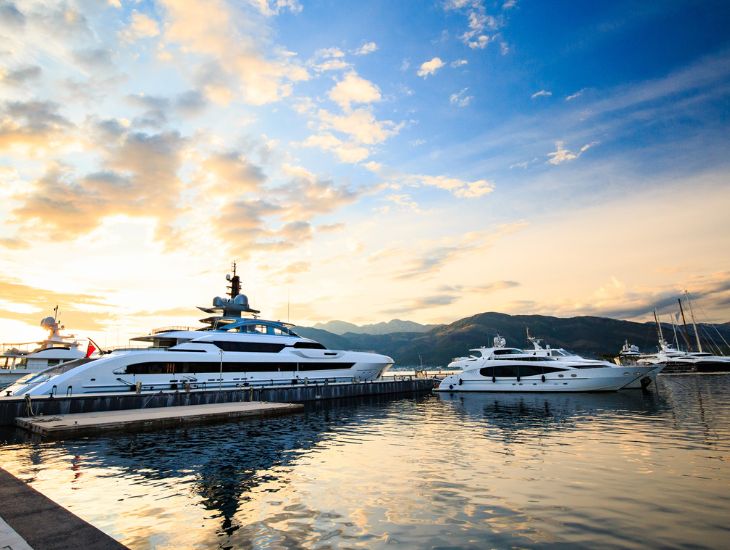As the superyacht build market explodes, perhaps in part due to high-net-worth individuals reassessing lifestyle priorities and the emergence of new owners, there’s been a significant increase in the global order book, particularly for smaller superyachts.
According to Boat International, there’s been a rise in demand for yachts under 45-metres, with a 30.5% uplift in the sub 30-metre range. Although those of us in the sector would probably use the term superyacht to describe vessels larger than this, the actual classification is anything above 24-metres in length is officially a superyacht.
The result has been a huge need for crew for smaller yachts and our sub 40-metre desk is crazy at the moment.
But one of the most common questions we get asked by crew with all types of experience on all sizes of yacht is what are the pros and cons of working on smaller superyachts?
The answer can be complicated, depending on the onboard role you are going for, however one thing I can say is that the smaller the yacht doesn’t always mean the smaller the wage packet and the salaries on offer across all roles can be incredibly generous. For example, a sole Stewardess onboard a 27-metre can easily be on the same salary as a 2nd Stewardess onboard a 60-metre.
Smaller superyacht jobs aren’t necessarily for green and inexperienced crew either.
So, what are the major pros and cons? Let’s start with the positives…
Reasons FOR working on smaller superyachts
- More opportunities – Like I said above, there are more yachts under 45 metres on order than ever before and this is already leading to more jobs. There are plenty of seasonal positions out there as well as full-time positions that offer great off-season opportunities!
- Quick learning curve – Onboard smaller yachts, junior crew are exposed to all areas of the department and everyone is expected to get stuck in and help each other out. For example, as a Stewardess, you’ll be operating service, laundry, back of house and even sometimes assisting in the galley, meaning you’ll likely become a decent all-rounder if and when you want to step up.
- Great practice – For Officers who are aspiring Captains, smaller yachts tend to come in and out of port a lot more. For Captains that will offer drive time, this can be a great opportunity to hone your skills in docking and un-docking the yacht. You’ll also get plenty of exposure to the paperwork aspect in the bridge, i.e., port clearance.
- More exposure – Onboard smaller yachts, you’ll get more exposure to the owner(s) directly which gives you the chance to build a long-lasting personal relationship. This can sometimes lead to great longevity and very generous ever-increasing salaries and perks.
- Fast promotion – Getting stuck in and getting to know every aspect of the yacht means you’re more likely to step up into a more senior role quicker than on a larger yacht.
- Busy charter – A large proportion of the smaller superyachts are busy seasonal charter yachts. The tips aren’t as high once divided out, but they tend to be constantly busy and can be an added boost to an already fairly generous salary.
- Off-season opportunities – The majority of yachts under 40-metres are seasonal so for six months, you could be flat out and then for the remainder of the year, have a lot of downtime. As an example, I placed a Captain on a 30-metre sail yacht who has the option to take three months off fully paid for during the off season. If it’s purely seasonal, it can give you the option to work in another industry entirely during the off season such as doing ski seasons, with the security of a guaranteed job onboard when the summer season starts again.
- Open to couples – It’s by no means guaranteed but, on the whole, smaller superyachts are more open to couples’ positions, especially as it makes cabin sharing a lot easier.
Reasons AGAINST working on smaller superyachts
- Intense workload – With fewer crewmembers to share the workload, it can be very intense onboard yachts under 40-metres. You might learn a lot in a short space of time, but it will be a high-pressure environment. Most owners will still expect incredibly high levels of service but won’t have the space onboard or desire to employ a larger crew to manage the workload.
- Repetitive – The itineraries for some small yachts can be fairly repetitive and based in the same location season after season. Usually only the larger yachts tend to travel off the beaten track, i.e., Costa Rica, Galapagos, Fiji etc.
- Less time off – During your contract period, be that seasonal or permanent, very few smaller yachts will offer any form of rotation, no matter how senior you are. Check out our recent Crew Salary and Leave report for more info.
- Glass ceilings – Although you could progress quite quickly, there will actually be fewer promotion opportunities because there are less roles onboard. A Chief Stewardess in charge of an interior team of three onboard a 35-metre superyacht won’t be a shoo-in for a Chief Stewardess position onboard a 65-metre. You will most likely have to take a step down to then step up again on larger yachts.
- Less space – A smaller boat equals smaller cabins, more shared facilities and fewer luxuries for crew i.e., crew gyms.
- Smaller budgets – Sometimes the budgets are not as generous onboard smaller superyachts so there’s not always the most high-tech, top of the range systems and gear.
- Less time for training – On that note, Captains and senior crew don’t always have the time or budgets to commit to formal training and instruction, leaving you to your own devices and trusting your gut, being thrown in more towards the deep end!
- Potential friction –With fewer crew to spend your time with, you’ll have to be tight-knit as there are less opportunities to escape from the crew.
The other question I get asked a lot is can you easily transition from a smaller to larger superyacht and that answer is much simpler – yes.
Having experience across several departments and being used to working under intense pressure could be a real bonus on your CV and potentially make you more employable than someone who has only worked on a 70-metre polishing all day.
There are many different benefits associated with both smaller and larger yachts. At the end of the day, it comes down to what you are looking to get out of the job and also what overall programme would suit you best!
For any crew/role requirements onboard smaller superyachts, please do not hesitate to get in touch!




